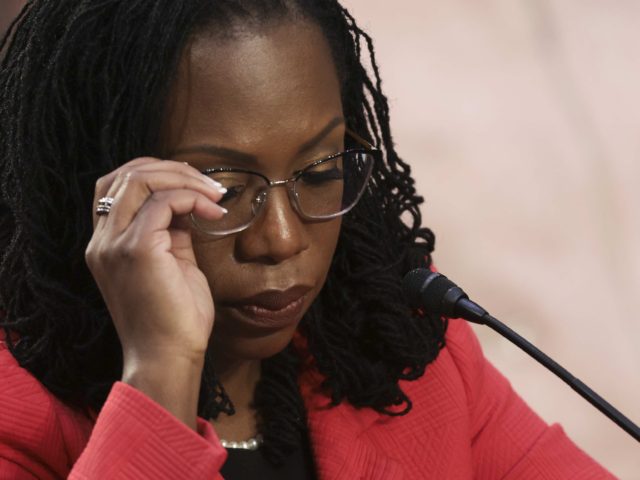On the one hand, Judge Ketanji Brown Jackson says she does not believe in judicial activism and will stay within the law. On the other, she will not say what the limits are to the unwritten rights that she might later discover as a Supreme Court justice.
That was the result of a careful but determined questioning Tuesday by Sen. John Cornyn (R-TX), who probed Judge Jackson’s judicial philosophy on the second day of her confirmation hearing at the Senate Judiciary Committee on Tuesday.
Cornyn began in disarming fashion, telling the judge that he planned to “nerd out” with her over obscure matters in legal doctrine. Often, Senators use such discussions to preen about their own supposed legal expertise on national television.
This time was different. Cornyn asked Judge Jackson about the Supreme Court’s past decisions on gay marriage, when it discovered a right that was not explicitly written into the Constitution, and superseded dozens of state laws, for and against.
He revisited Judge Jackson’s approach to judicial activism, and the nominee reiterated that in her approach to her work as a judge, she left public policy decisions to the legislature, and stayed within the bounds of the law and judicial precedent.
But when Cornyn questioned her further about the doctrine of “substantive due process” — the idea that the Constitution incorporates rights that it does not actually enumerate explicitly — Judge Jackson seemed flummoxed by his queries.
On the one hand, she defended the idea that the Constitution could incorporate rights that were a part of common tradition. On the other, she could not answer why, if traditional marriage were part of that cultural tradition, it was somehow excluded.
Sen. Cornyn continued, pointing out that the same discretion that judges used to find new rights in some cases could be abused in other cases. He referred to the notorious Dred Scott case upholding slavery; she seemed not to follow his argument.
So the Senator tried again: “What other unenumerated rights are out there?” Judge Jackson was evasive, saying that the question was “hypothetical.” Cornyn noted that while she purported to oppose judicial activism, she set no boundary for it.
Judge Jackson protested that she would be bound by the law and by judicial precedent. But Sen. Cornyn pointed out that as a Supreme Court justice, she would be largely unconstrained by precedent, given the Court’s tendency to set new precedents.
Joel B. Pollak is Senior Editor-at-Large at Breitbart News and the host of Breitbart News Sunday on Sirius XM Patriot on Sunday evenings from 7 p.m. to 10 p.m. ET (4 p.m. to 7 p.m. PT). He is the author of the recent e-book, Neither Free nor Fair: The 2020 U.S. Presidential Election. His recent book, RED NOVEMBER, tells the story of the 2020 Democratic presidential primary from a conservative perspective. He is a winner of the 2018 Robert Novak Journalism Alumni Fellowship. Follow him on Twitter at @joelpollak.

COMMENTS
Please let us know if you're having issues with commenting.